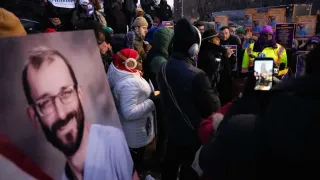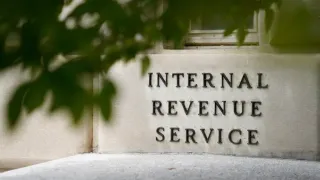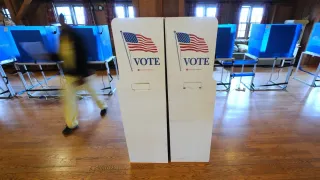February 5, 2017
SF Sues Trump on Sanctuary Cities
Seth Hemmelgarn READ TIME: 4 MIN.
San Francisco City Attorney Dennis Herrera announced Tuesday that he is suing President Donald Trump, saying he is trying to "coerce" local authorities into "abandoning what are known as 'sanctuary city' laws and policies."
Trump issued an executive order last week to withhold federal funding from sanctuary cities, and another one last Friday that barred immigrants from seven predominately Muslim countries from traveling to the U.S.
"San Francisco faces the imminent loss of federal funds and impending enforcement action if it does not capitulate to the president's demand that it help enforce federal immigration law," Herrera's suit states.
He also said that Trump's executive order "is a severe invasion of San Francisco's sovereignty" and the lawsuit maintains that the Constitution "establishes a balance of power between the state and federal governments."
The lawsuit says that under the executive order San Francisco could lose as much as $1 billion in federal funding.
Meantime, elected leaders in the Bay Area and across the country expressed outrage over Trump's executive order to withhold federal funding from sanctuary cities.
At his State of the City address Thursday, January 26, the day after Trump announced his order, Mayor Ed Lee referred to the policy of protecting undocumented immigrants from being prosecuted for breaking immigration laws. Lee said he's "grateful" to be in a city "where we honor one another and stand up for each other."
"We are the sanctuary city now, tomorrow, forever," he said. The crowd at the refurbished Hibernia Bank, which included city supervisors, Police Chief Bill Scott, and numerous other officials, greeted the remark with a standing ovation.
"We don't talk about protecting immigrants," Lee said. "We stand shoulder to shoulder with them."
In a statement last Wednesday, gay state Senator Scott Wiener (D-San Francisco), said it was "a shameful day," but he said Trump's order "only strengthens my resolve to stand up against the alarming bigotry and hatred emanating from the White House. If President Trump believes signing a piece of paper will for one second change how San Francisco and California value and protect our immigrant neighbors, he is underestimating our strength and spirit. Our immigrant communities need us more than ever and we will be there for them every step of the way. Trump can try to build his wall and he can try to cut off funding for sanctuary cities, but he's in for one hell of a fight."
San Francisco District 8 Supervisor Jeff Sheehy, a gay man who represents the Castro and other neighborhoods, stated, "San Francisco is a city of immigrants - and will always be a sanctuary for those seeking love and acceptance. Trump's proposed budget cuts would hurt the most vulnerable among us and must be stopped. We're going to fight these actions with all our might."
Among the federal assistance San Francisco gets is money related to HIV/AIDS.
While Sheehy and others may be prepared for battle, it's not yet known exactly how much money they'll be fighting for.
This fiscal year, the city's health department has budgeted $35 million in direct federal grants and $31.2 million in indirect federal grants, which pass through state agencies or other entities, according to Rachael Kagan, a spokeswoman for the health department.
Kagan referred questions about sanctuary cities and federal funding to the mayor's office. Lee's spokespeople didn't respond to an email from the Bay Area Reporter.
At a forum for San Francisco's community-based nonprofits Friday, January 27 to discuss the city's five-year financial plan and mid-year budget, Melissa Whitehouse, Lee's budget director, said, "The big change from last year is the uncertainty with the federal government."
But despite the city's voters rejecting a crucial sales tax measure in November and a projected budget deficit of $400 million over the next two years, Whitehouse said there would be no cuts or layoffs.
"The mayor is ready to face whatever comes. ... He doesn't want people to be panicked," she said.
San Francisco Controller Ben Rosenfield said that while uncertainty around federal funding is one of the key factors that could affect the city's forecast, he had "no more clarity in terms of what's at risk" since the sanctuary city executive order was announced.
He added that part of the trouble with predicting what could happen is that there's often "nothing more than 140 character" policy statements to go on, referring to Trump's penchant for using Twitter to broadcast his stances.
Other officials from San Francisco and around the Bay Area also quickly denounced Trump's order.
San Francisco Public Defender Jeff Adachi criticized the newly inaugurated president's desire to have people deported in a statement that said, "We stand in solidarity with millions of people throughout the country in opposition to Trump's xenophobic attacks on immigrants and believe no family should be torn apart because they cannot afford a private attorney. We call on the city of San Francisco and Mayor Lee to ensure detained immigrants are appointed public defenders to fight for them."
The city's 11 supervisors last week voted unanimously to provide $1.5 million in new funding for legal representation and other services for immigrants.
In a statement Wednesday, Oakland Mayor Libby Schaaf said, "Oaklanders rely on $130 million in federal funding for everything from early education programs like Head Start to getting officers out of their cars and onto our streets at a time when community policing is so desperately needed. We will not allow this president to play politics with our safety and security."
Berkeley Mayor Jesse Arreguin said, "We will not be intimidated by threats to cut funding to cities that believe in the fundamental notion that no person is illegal. No amount of federal funding is worth betraying our values."






